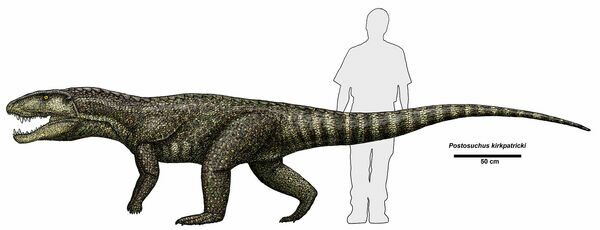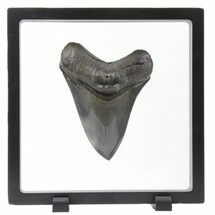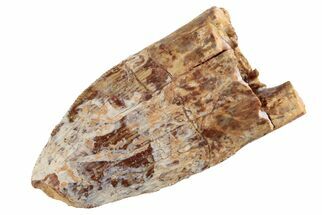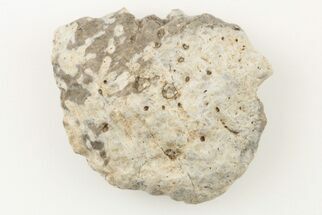This Specimen has been sold.
.72" Serrated, Triassic Reptile (Postosuchus?) Tooth - New Mexico
This is a .72" long, serrated, Triassic reptile (Postosuchus?) tooth from the Redonda Formation of New Mexico. It has beautiful enamel coloration and fine serrations on both edges of the blade.
Triassic reptiles from the southwestern United States are notoriously hard to identify, not least because many of the animals remain poorly described. While Postosuchus has not been formerly described from the Redonda Formation, these thin, blade-like teeth with fine serrations on both edges most closely match the description of their teeth.
Postosuchus ("Crocodile from Post") is an extinct genus of large rauisuchid reptiles that lived during the late Triassic in what is now the southwestern United States. It is a member of the clade Pseudosuchia, the lineage of archosaurs that includes modern crocodilians. It was one of the apex predators of its time, reaching length of 13-16 feet. This makes it significantly larger than the theropod dinosaurs that lived alongside it.
It looked a bit like a crocodile with long legs and had a massively built skull bearing serrated, dagger-like teeth. Its forelimbs were approximately 2/3 the size of its hind-limbs, leading to lots of debate about whether Postosuchus was bipedal or quadrupedal. In 2013, a major study of the skeletal structure concluded that Postosuchus may have been an obligate biped based on evidence from the anatomy of the digits, vertebrae, and pelvis. The proportions of the limbs and weight-bearing sections of the spine were very similar to many theropod dinosaurs, nearly all of which are thought to have been strictly bipedal.
Postosuchus ("Crocodile from Post") is an extinct genus of large rauisuchid reptiles that lived during the late Triassic in what is now the southwestern United States. It is a member of the clade Pseudosuchia, the lineage of archosaurs that includes modern crocodilians. It was one of the apex predators of its time, reaching length of 13-16 feet. This makes it significantly larger than the theropod dinosaurs that lived alongside it.
It looked a bit like a crocodile with long legs and had a massively built skull bearing serrated, dagger-like teeth. Its forelimbs were approximately 2/3 the size of its hind-limbs, leading to lots of debate about whether Postosuchus was bipedal or quadrupedal. In 2013, a major study of the skeletal structure concluded that Postosuchus may have been an obligate biped based on evidence from the anatomy of the digits, vertebrae, and pelvis. The proportions of the limbs and weight-bearing sections of the spine were very similar to many theropod dinosaurs, nearly all of which are thought to have been strictly bipedal.
SPECIES
Postosuchus?
LOCATION
Quay County, New Mexico
FORMATION
Redonda Formation
SIZE
.72" long
CATEGORY
ITEM
#202227
We guarantee the authenticity of all of our specimens.
 Reviews
Reviews













